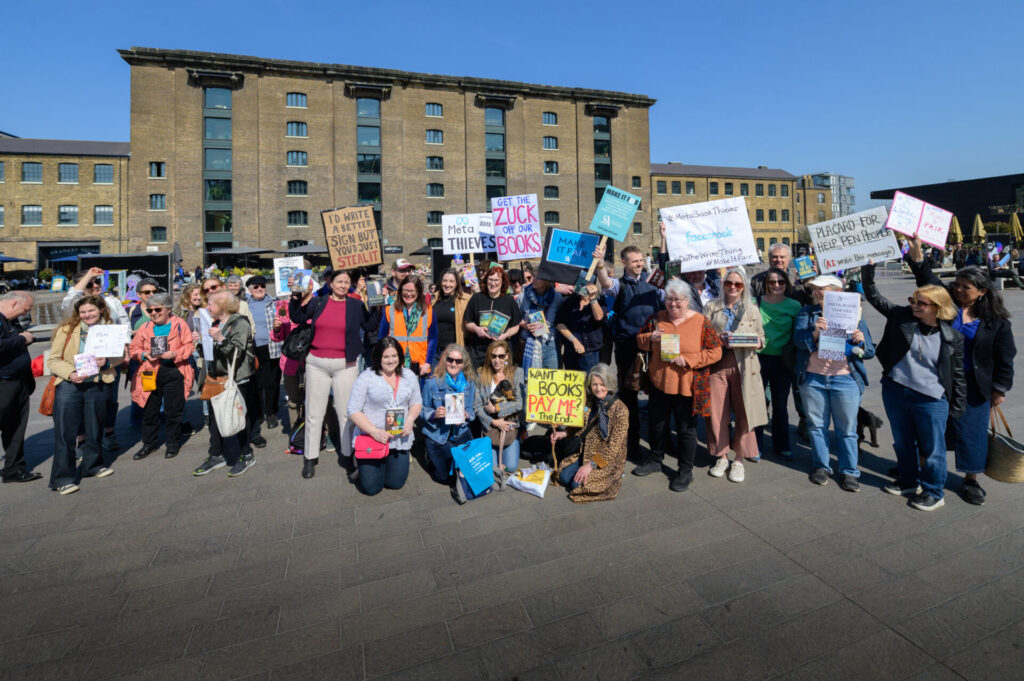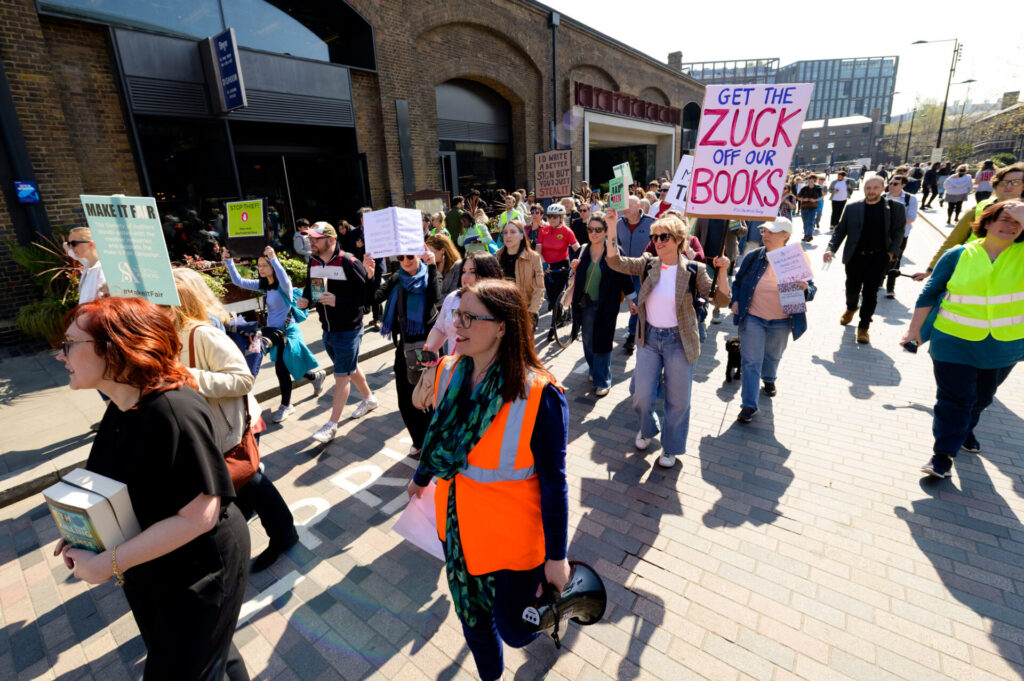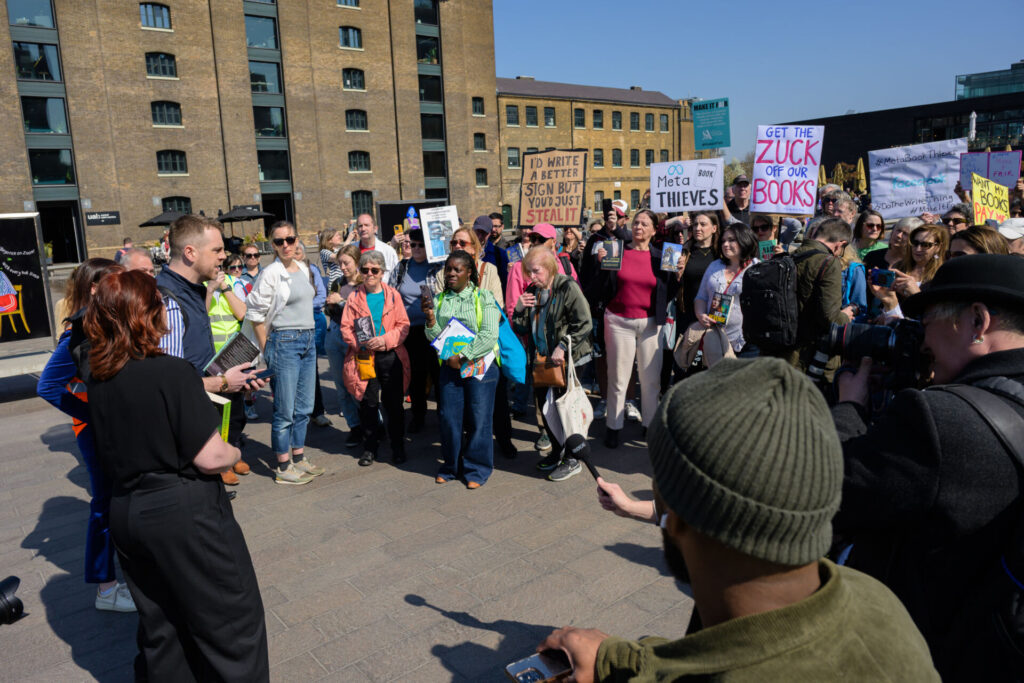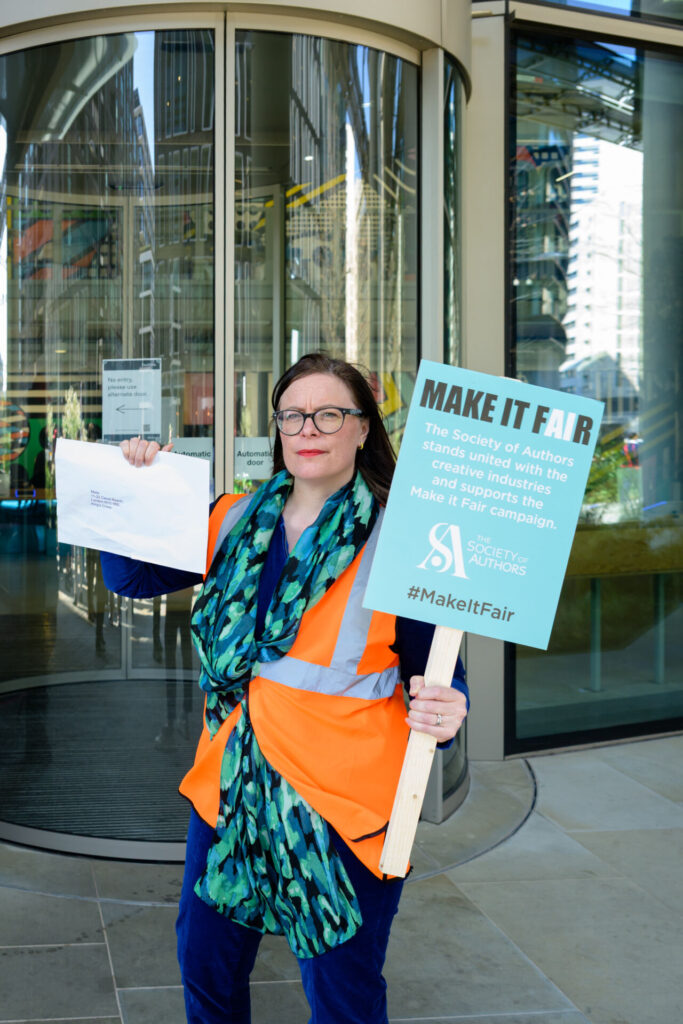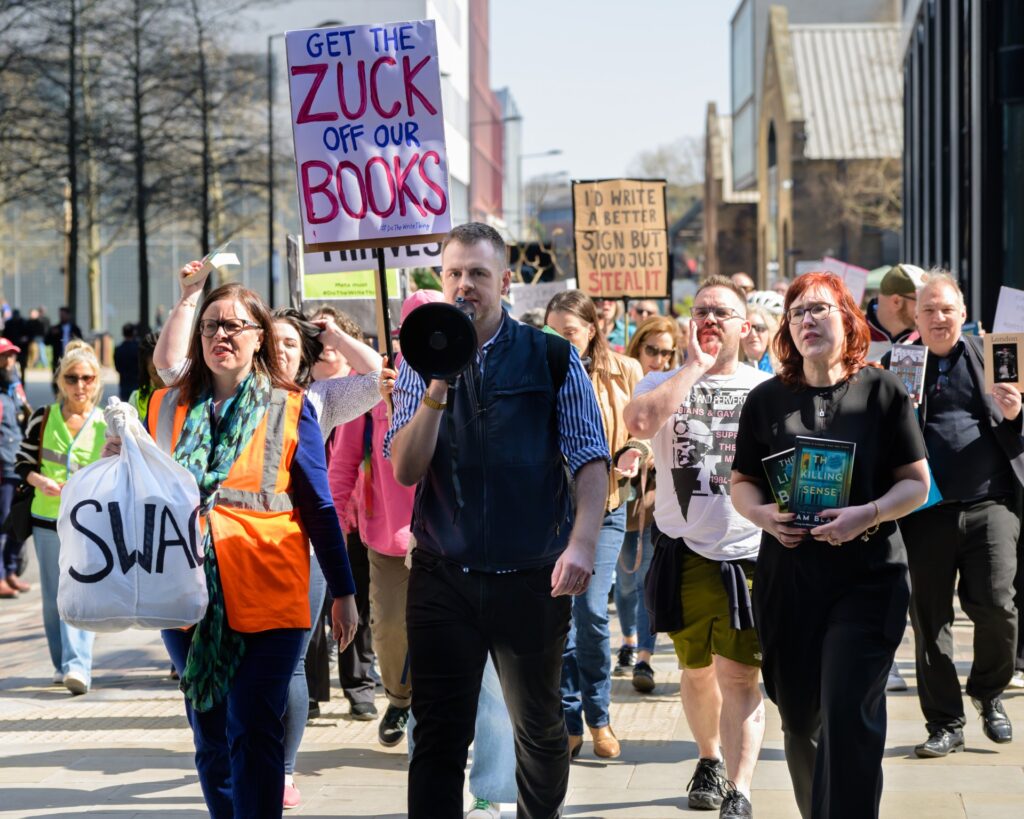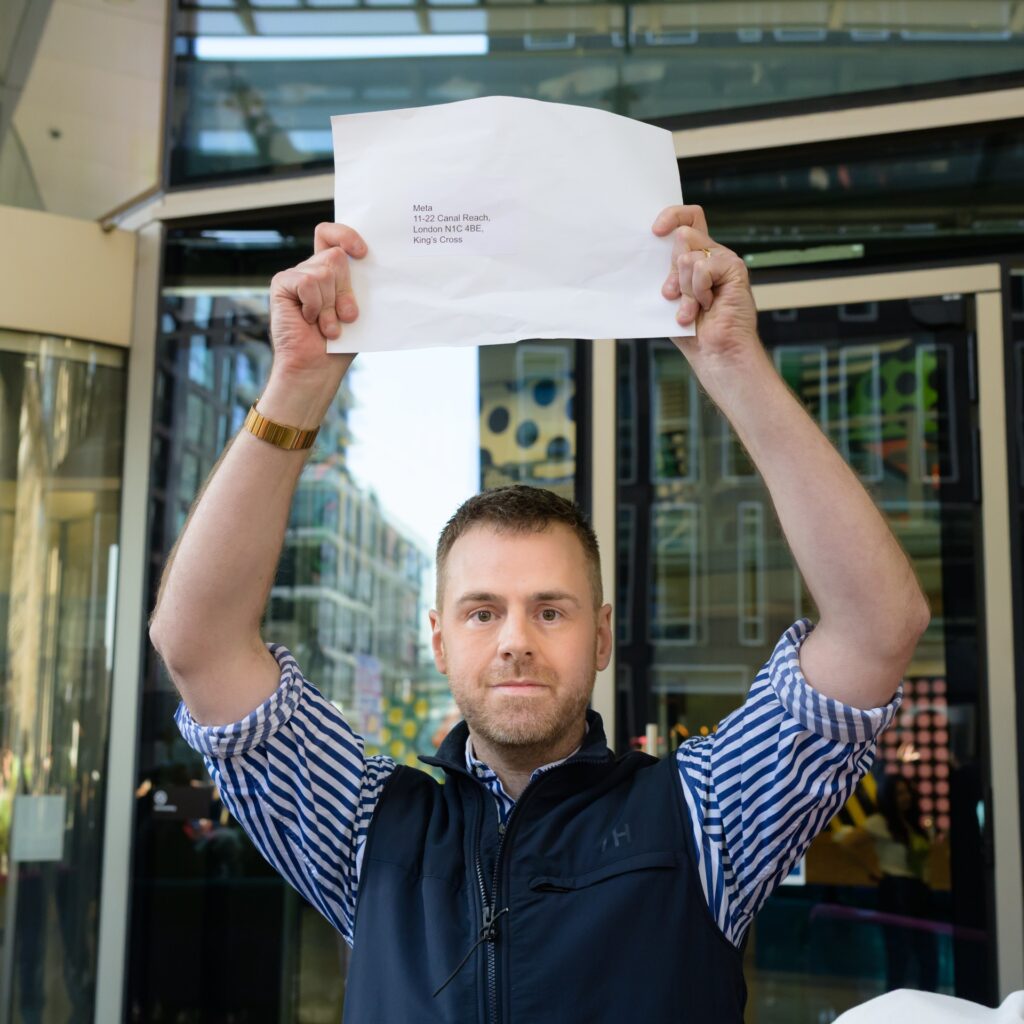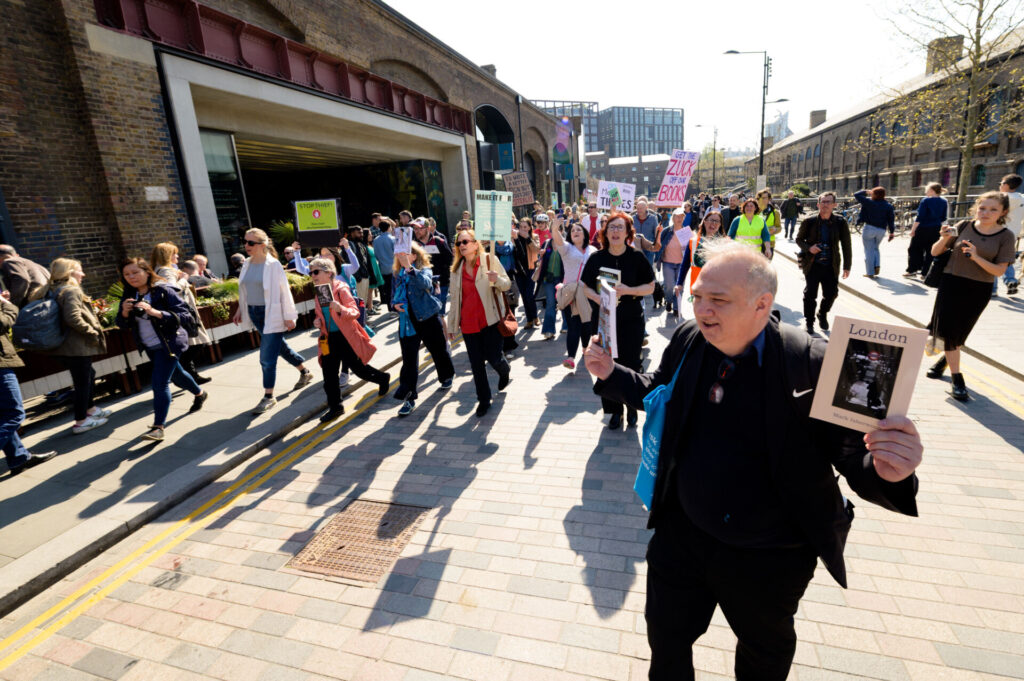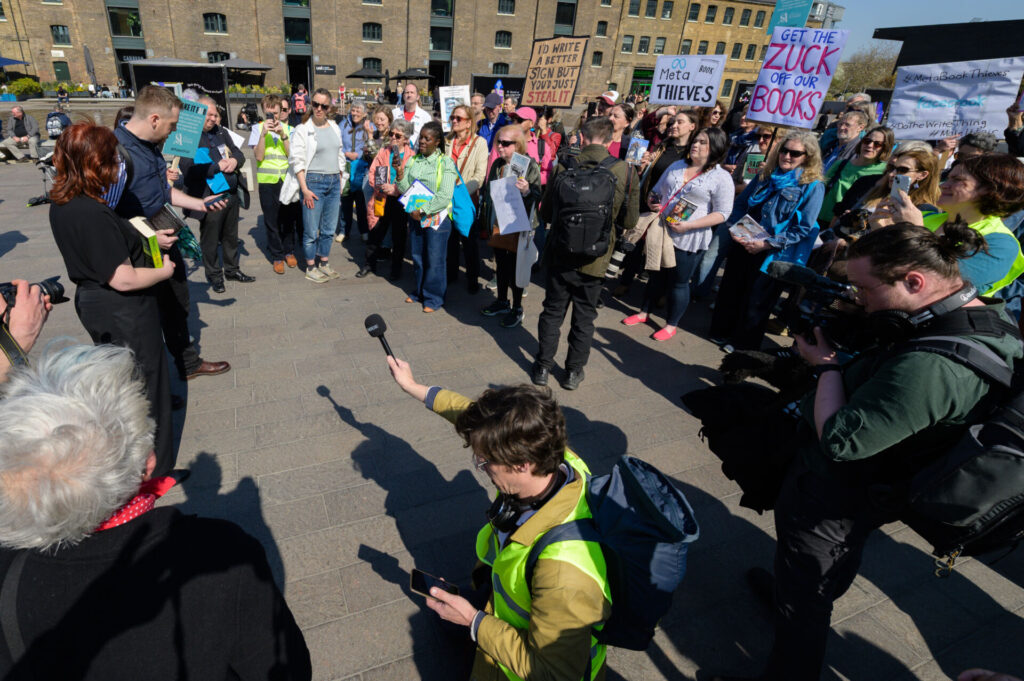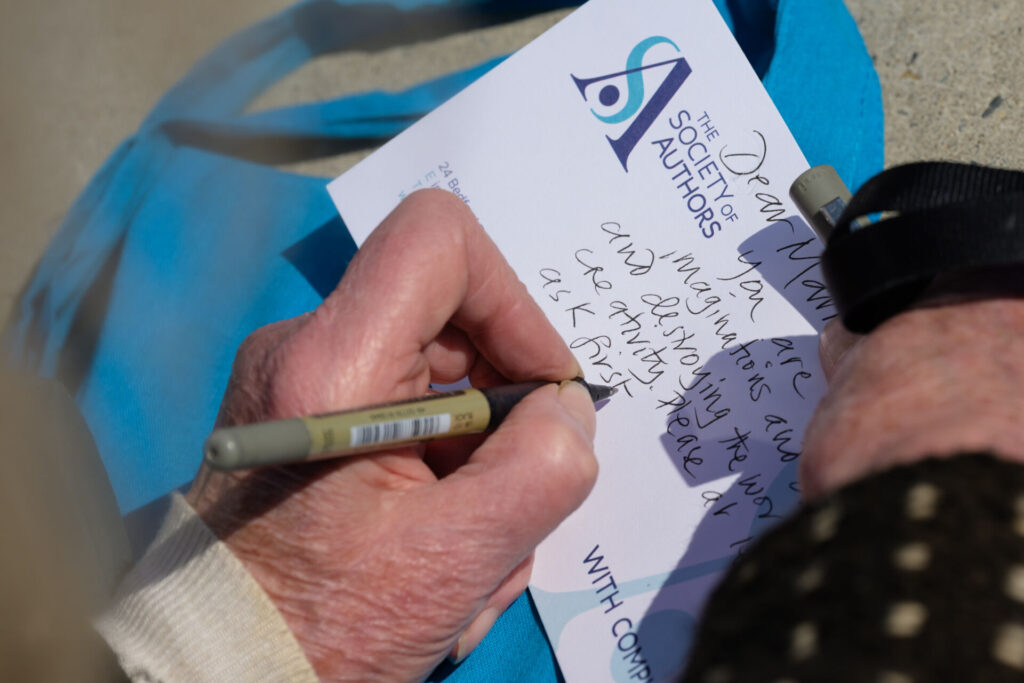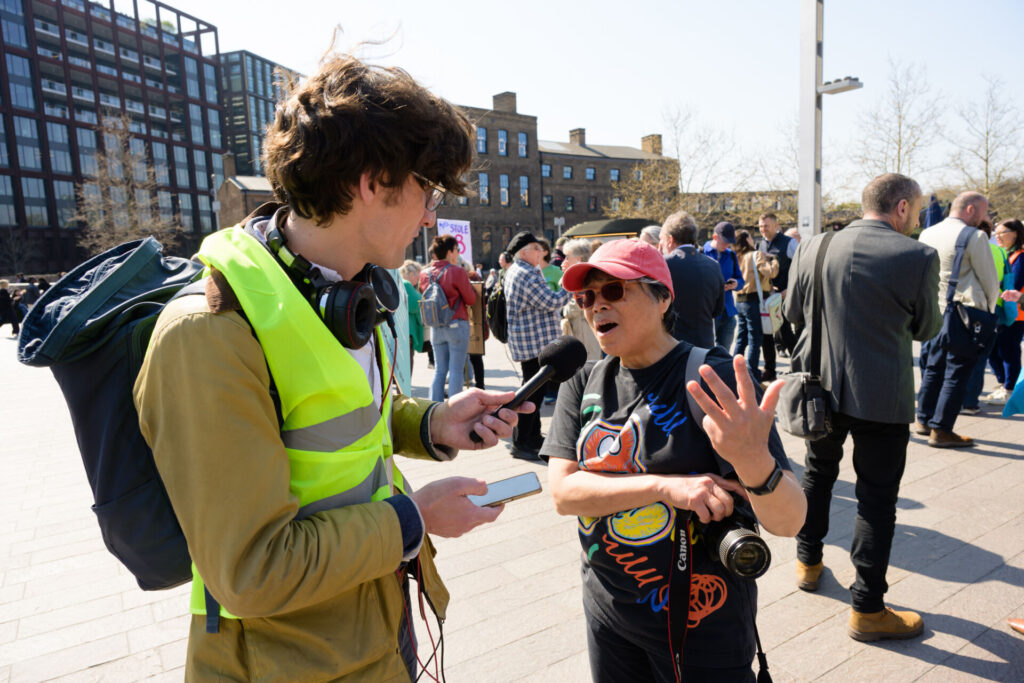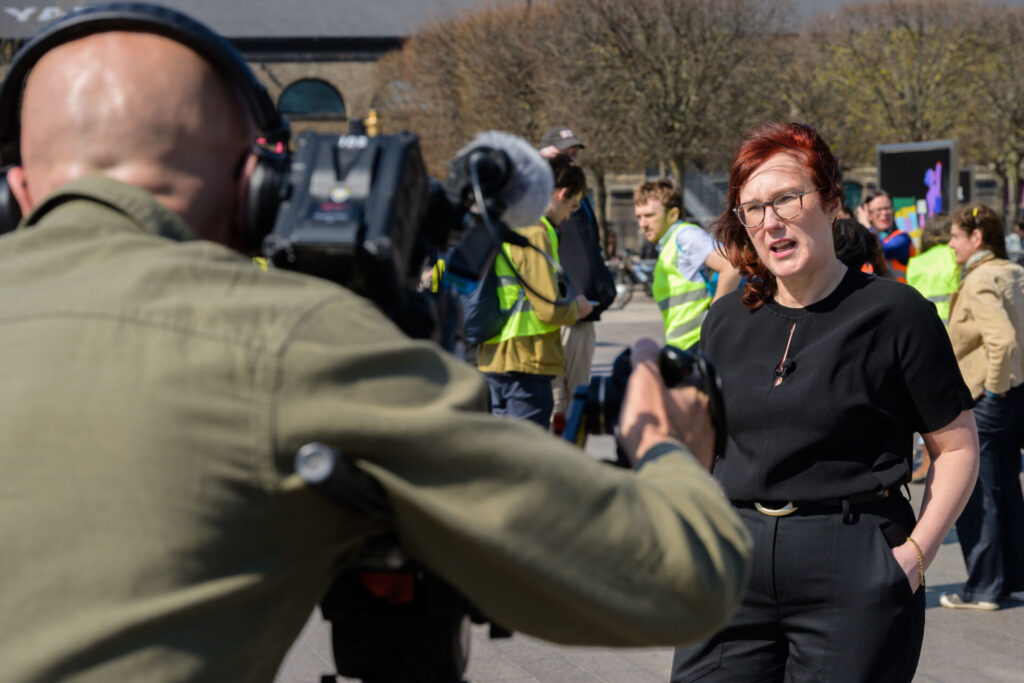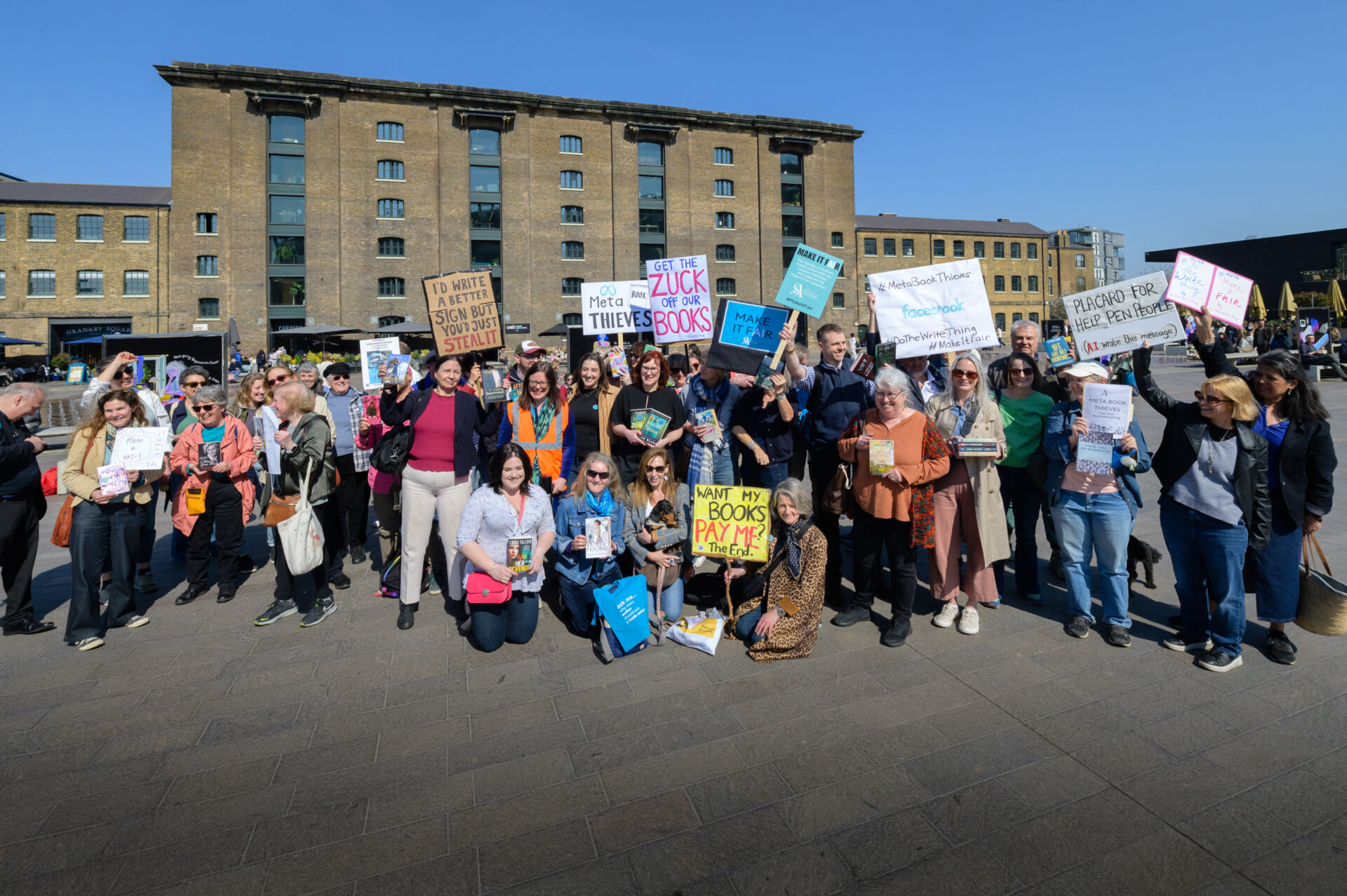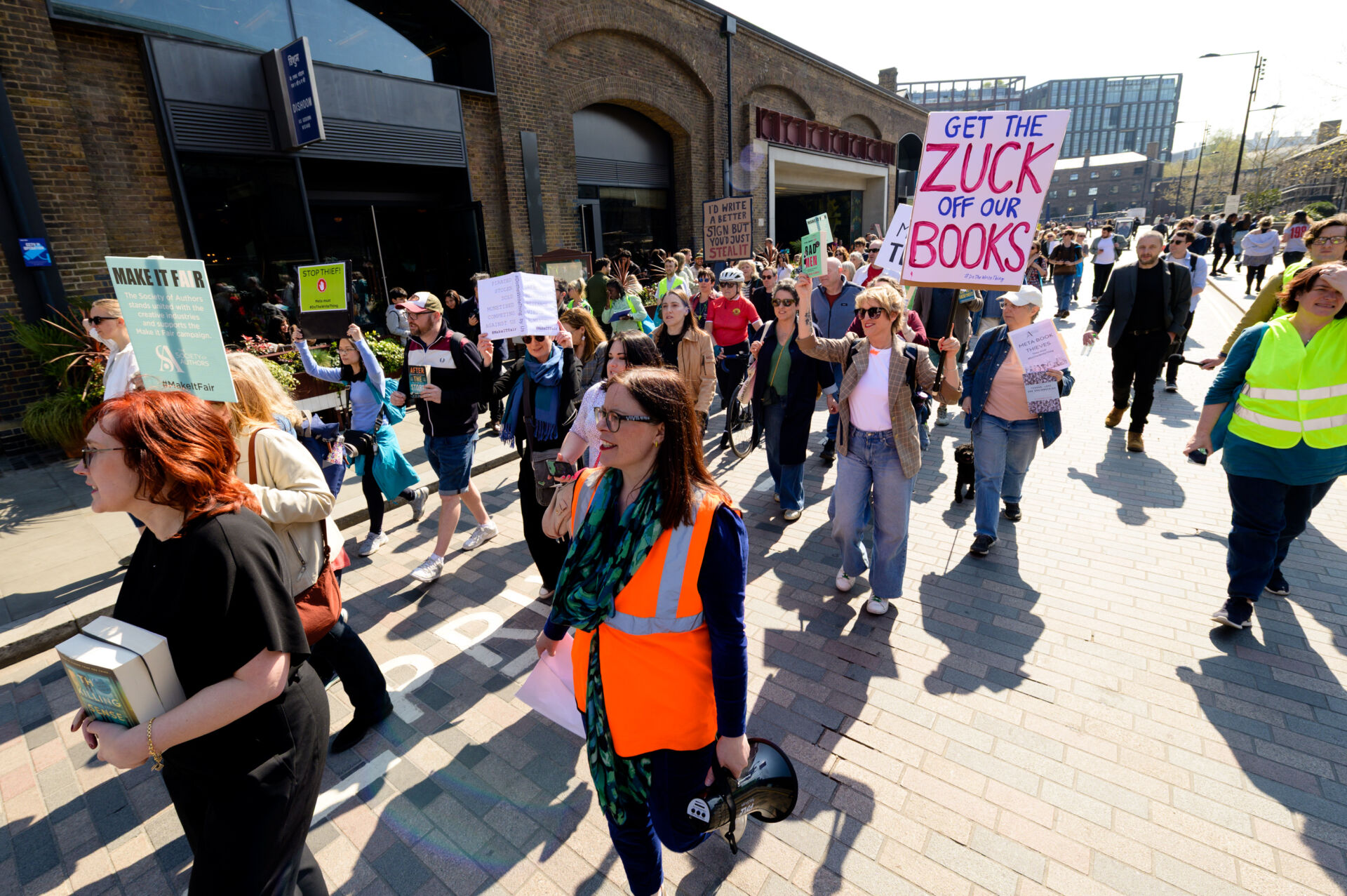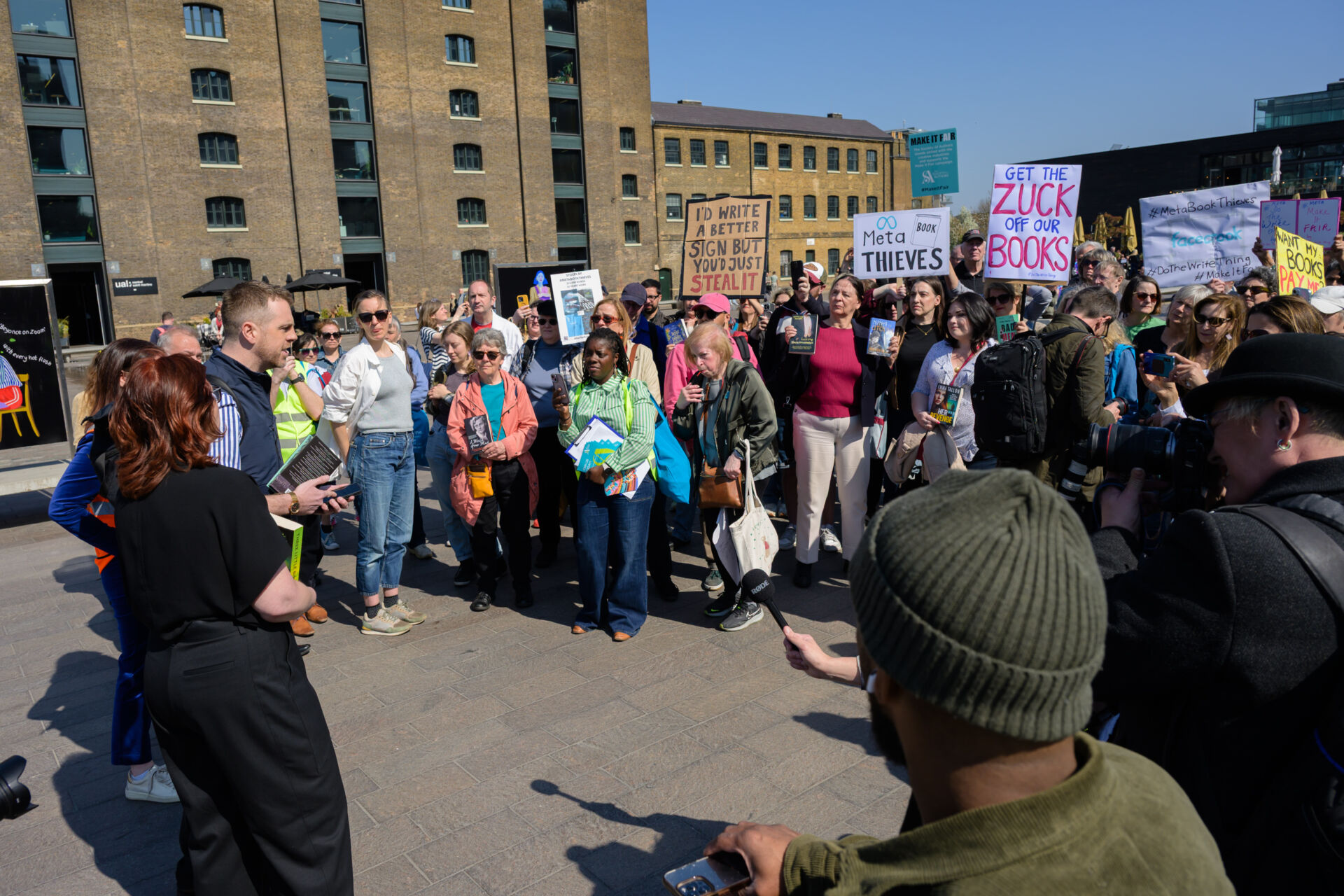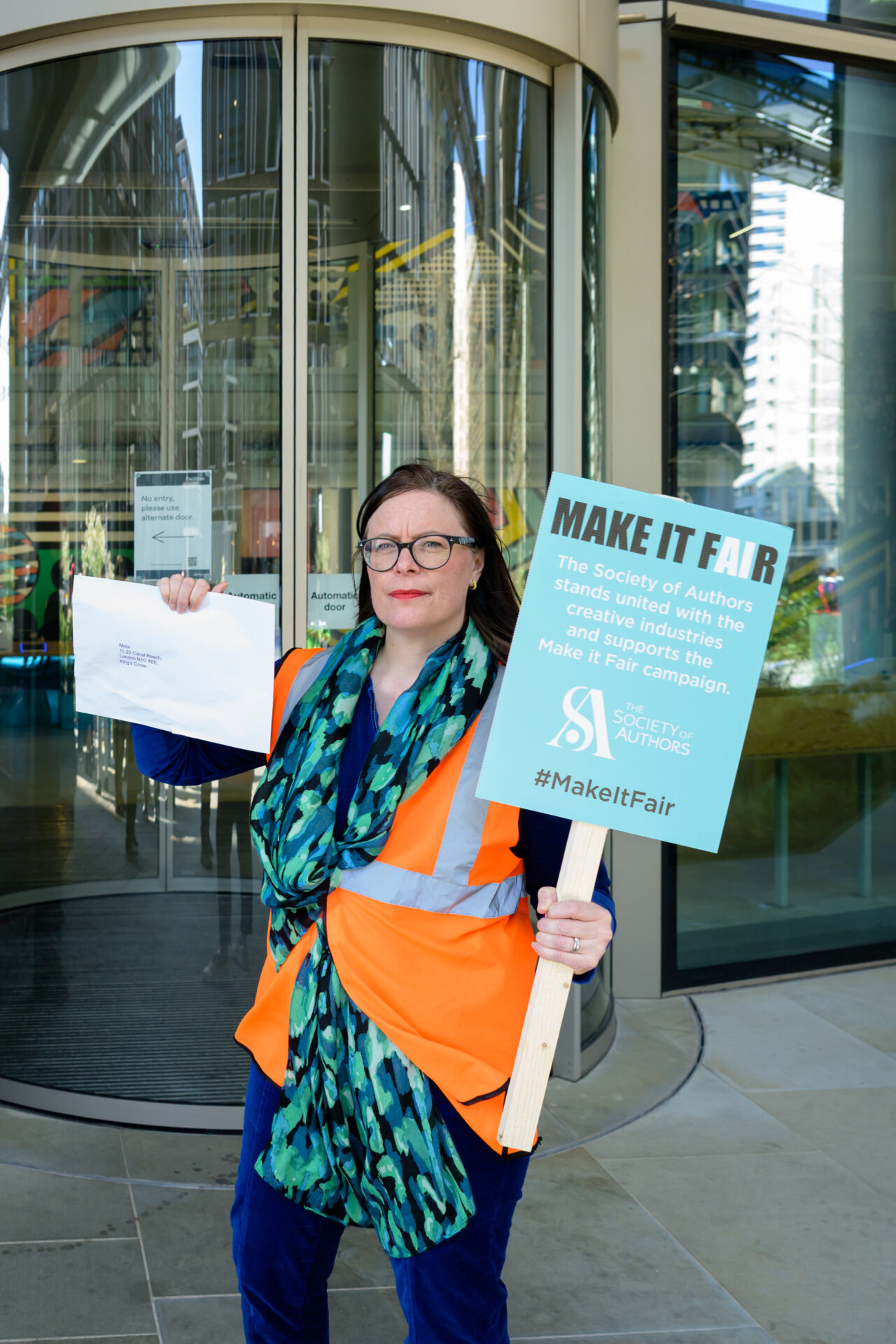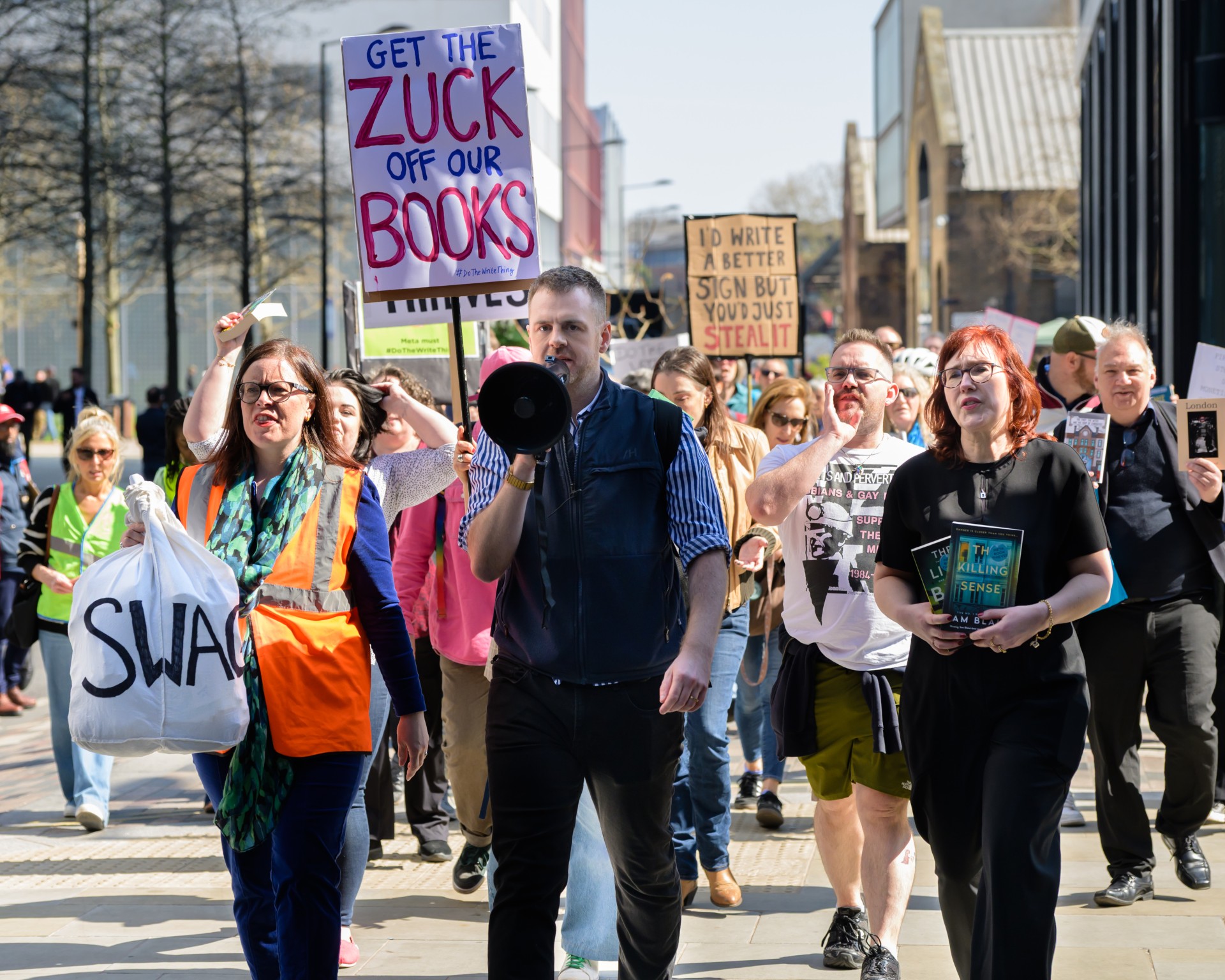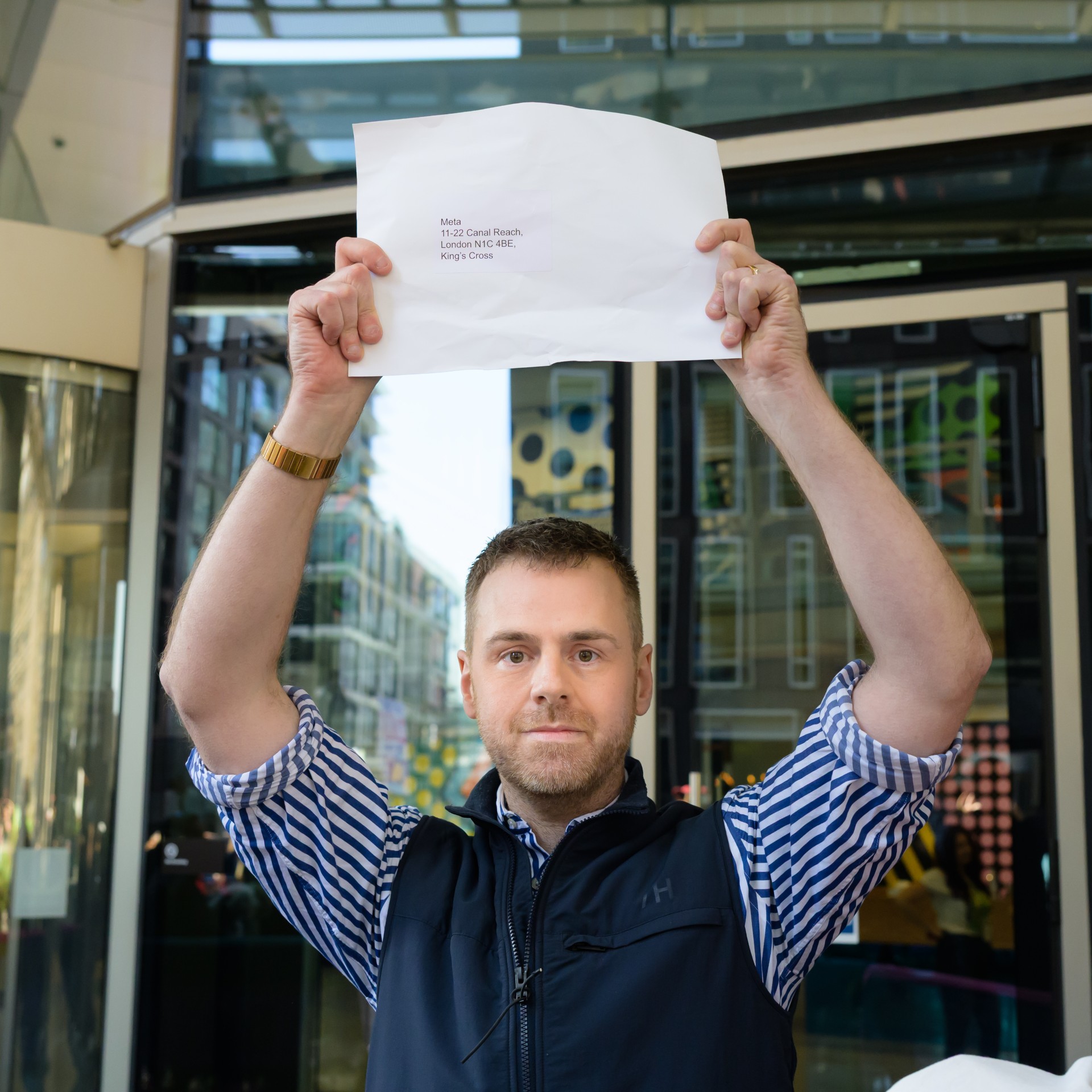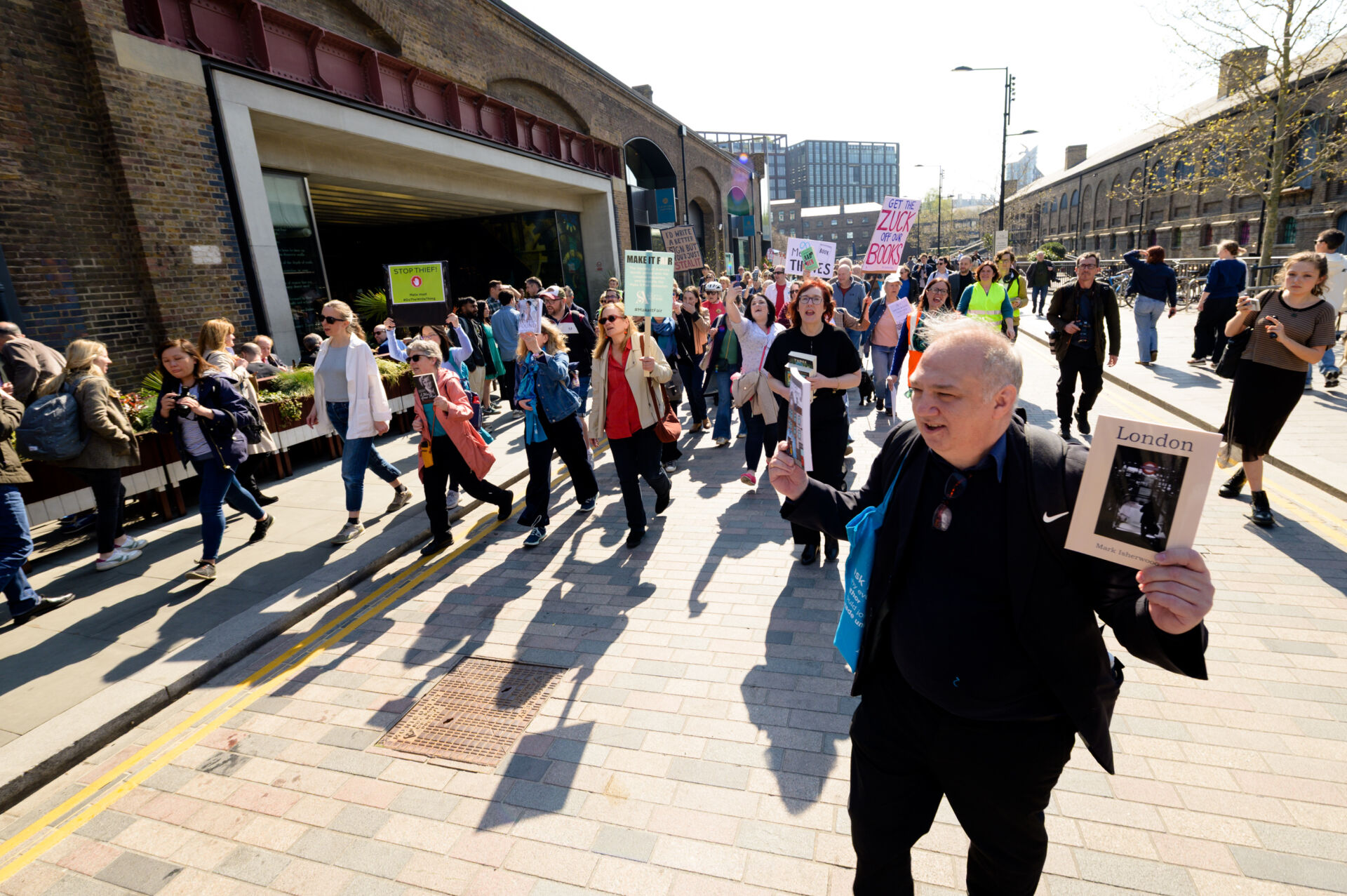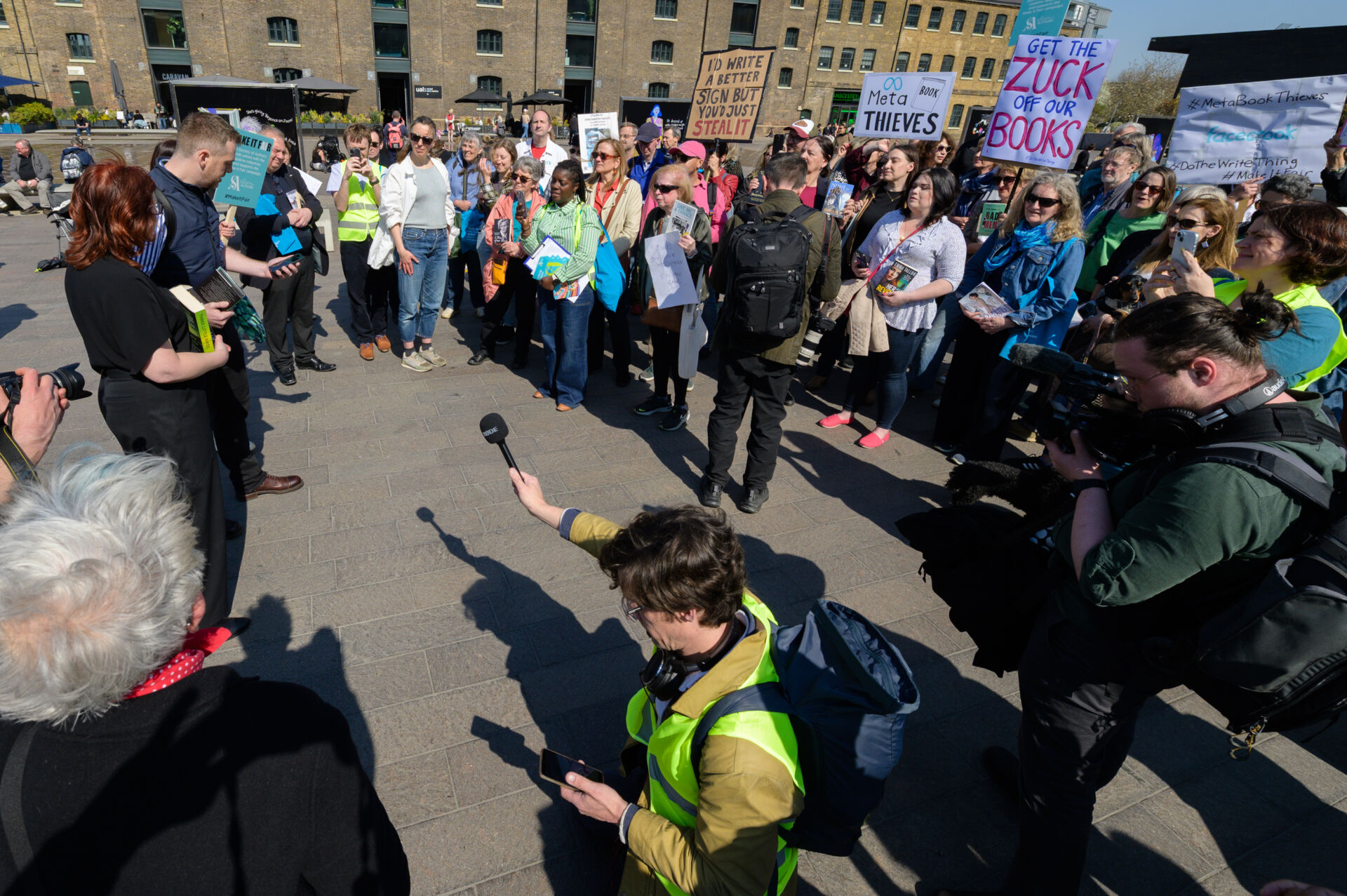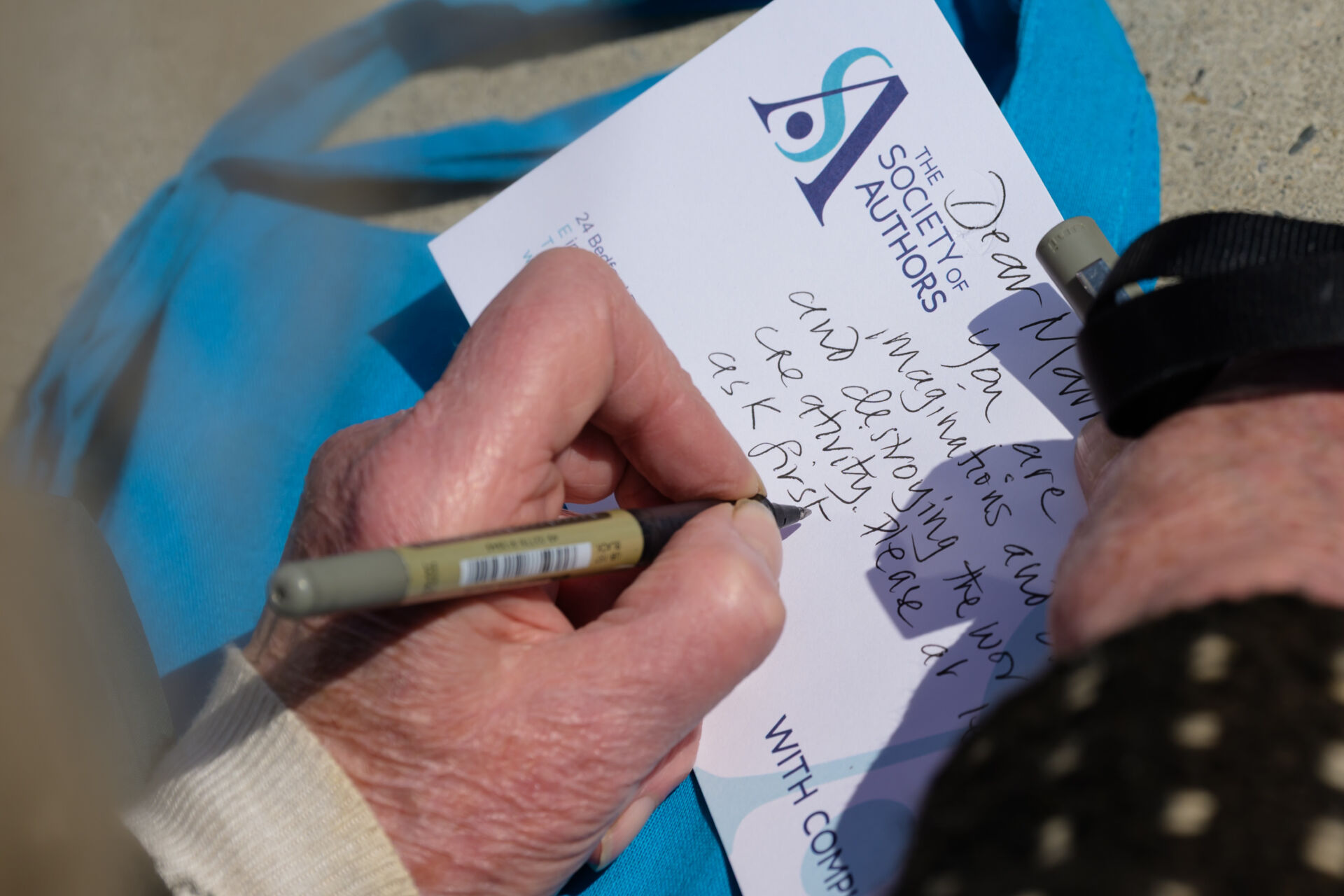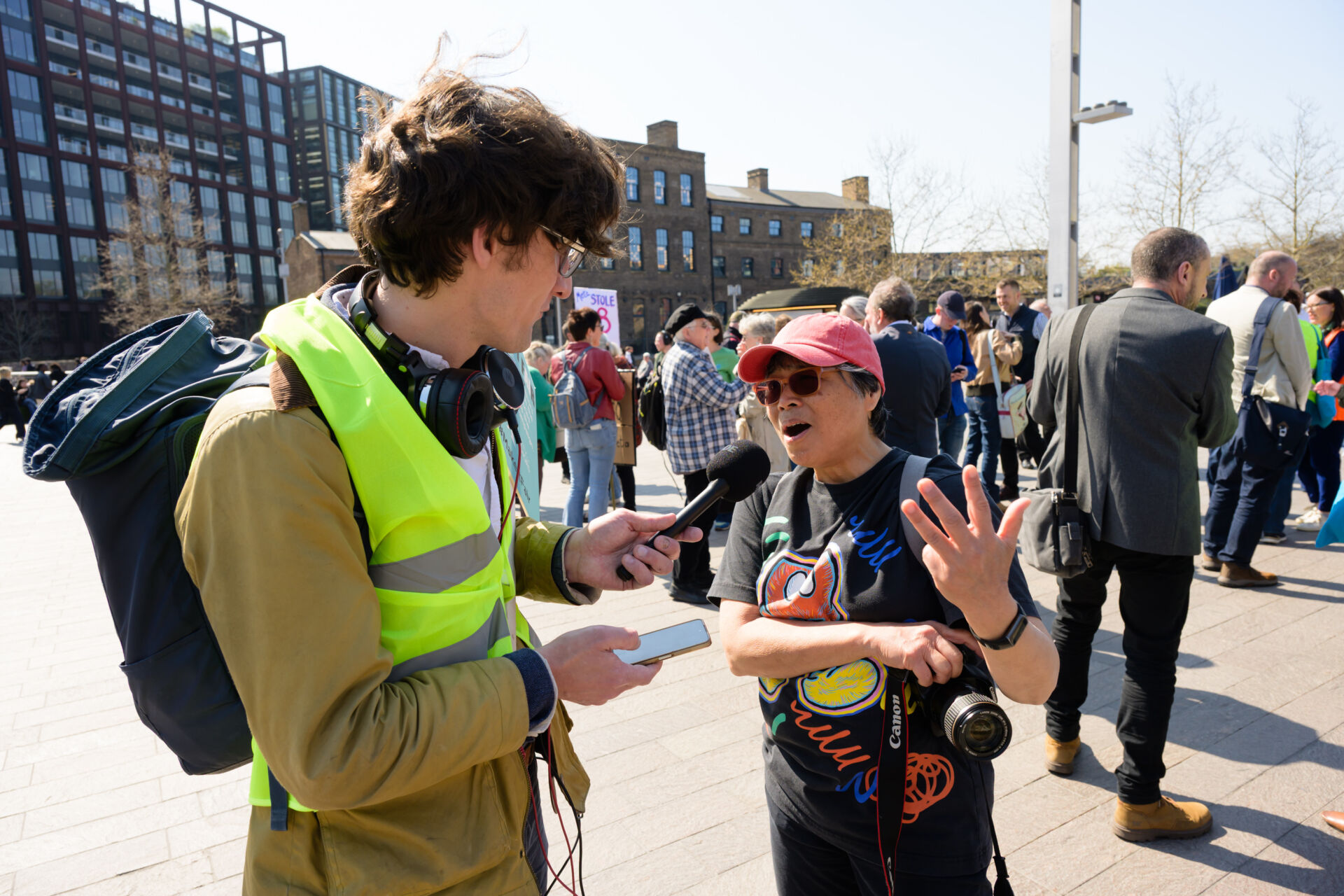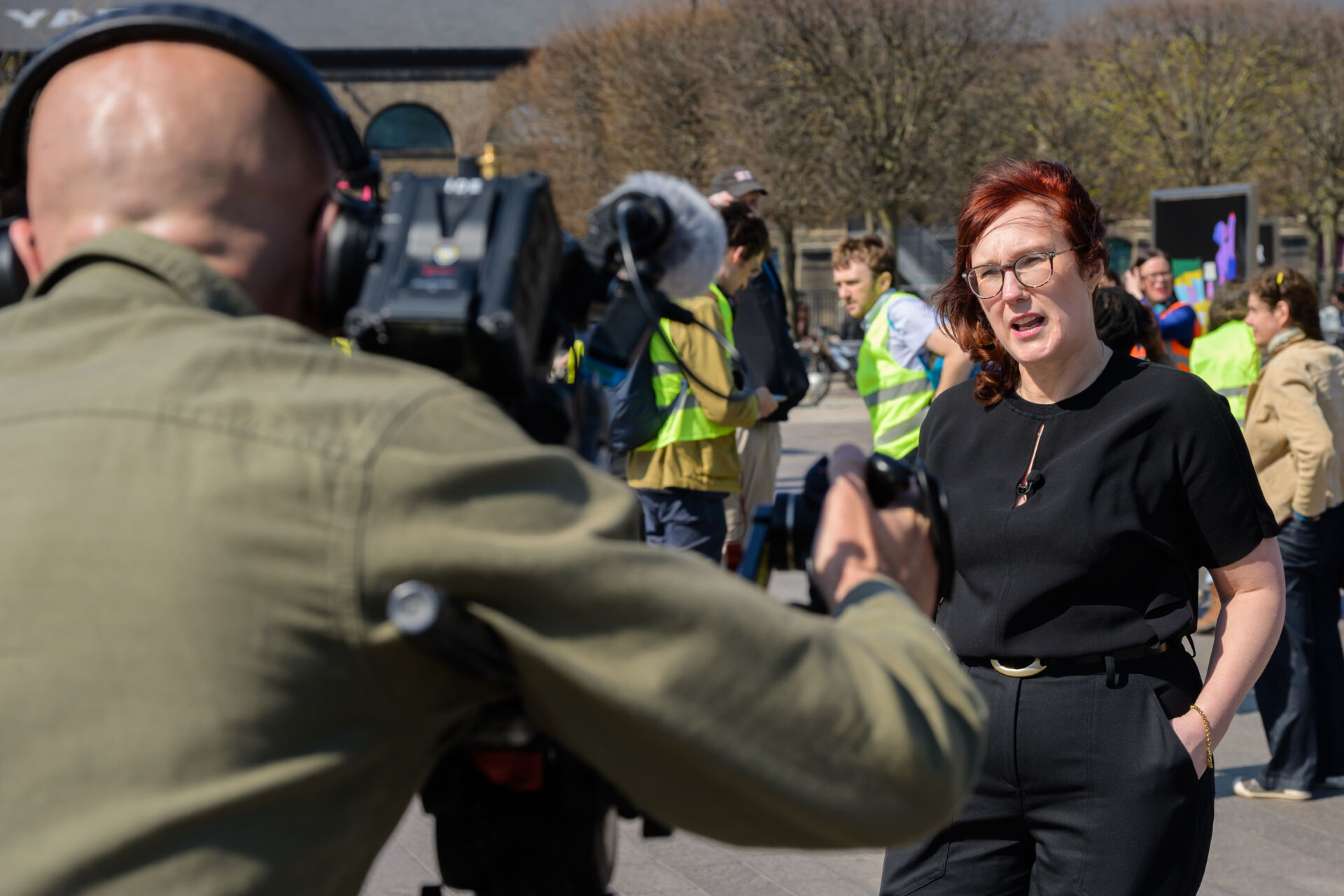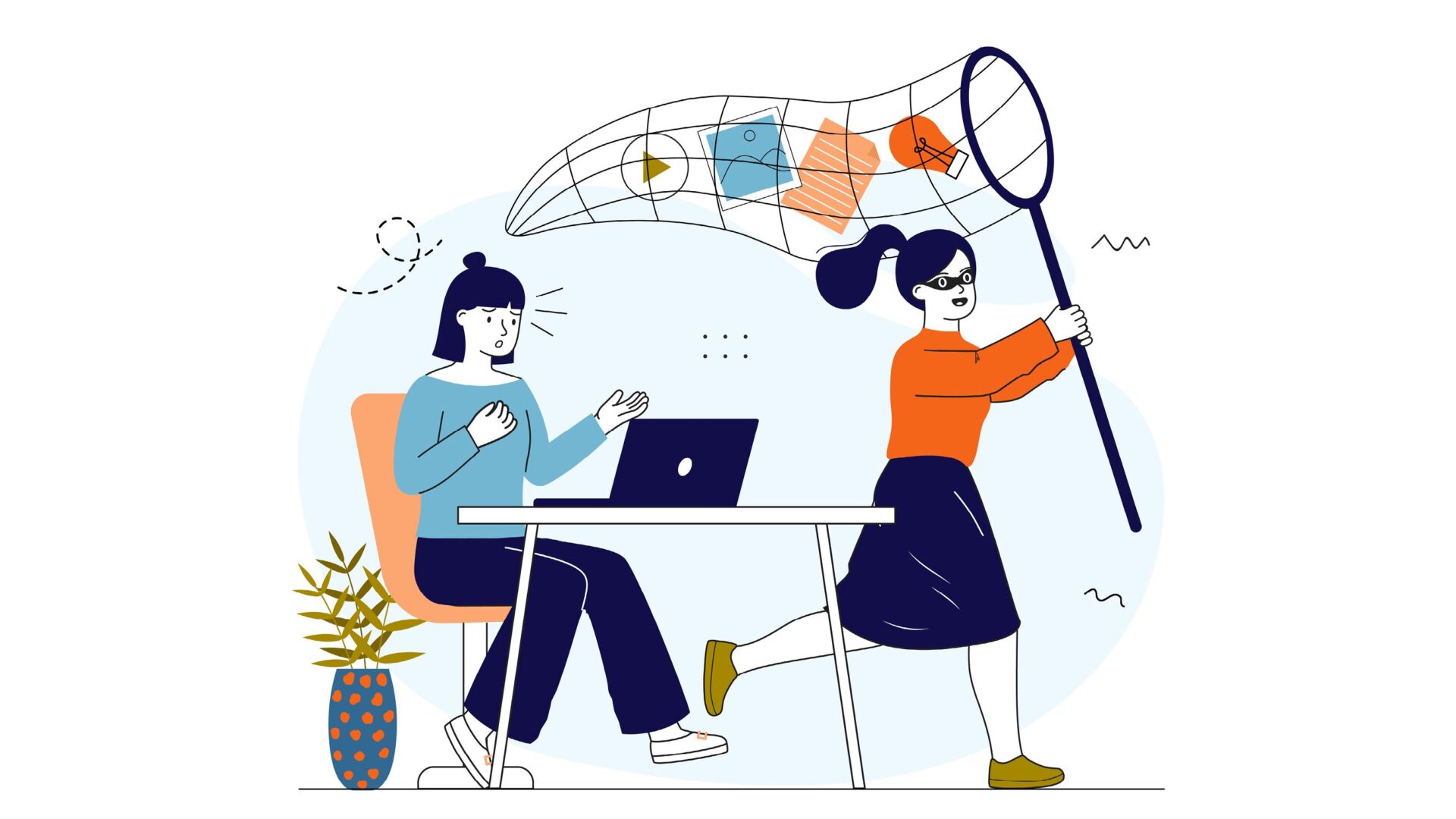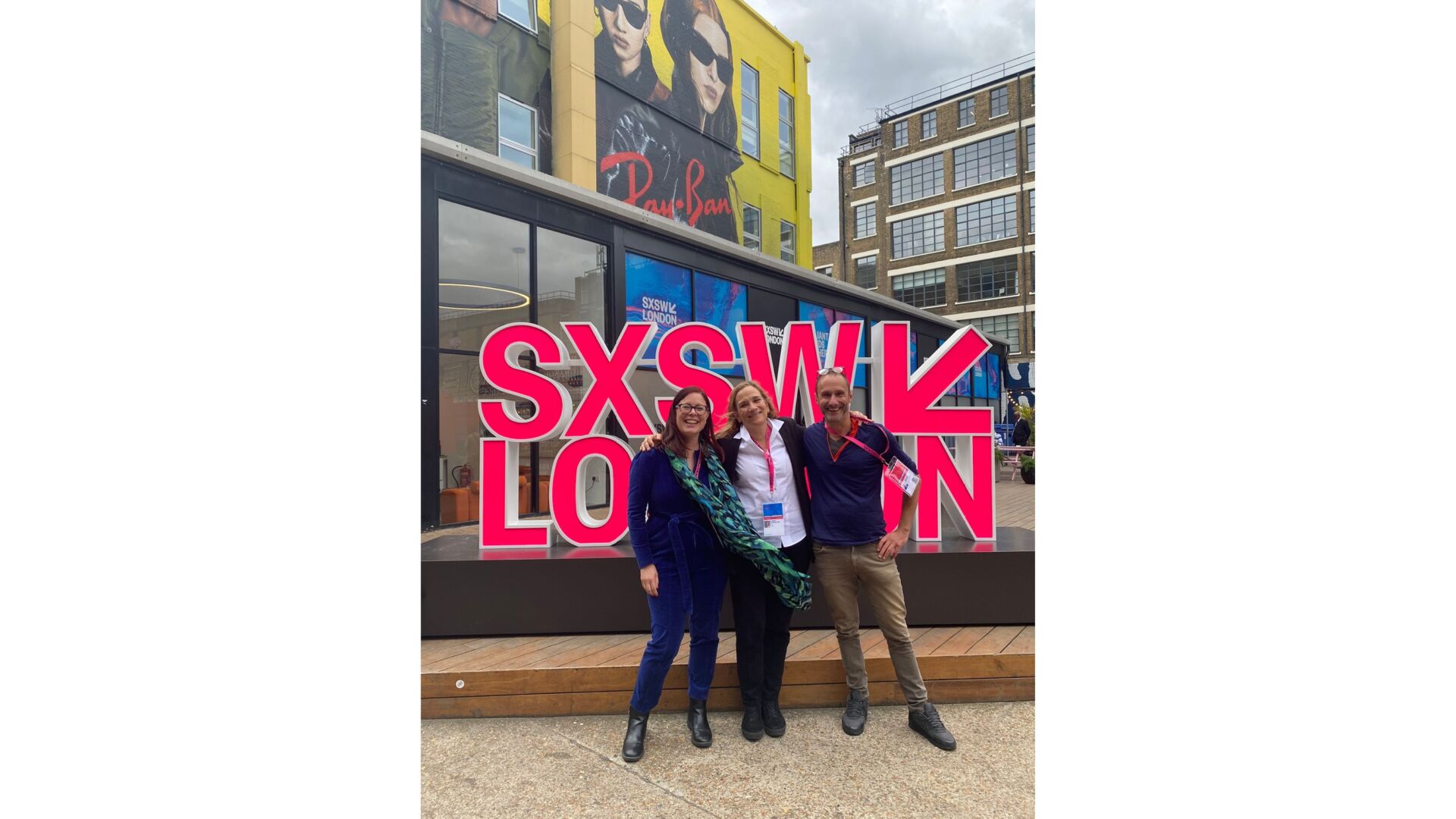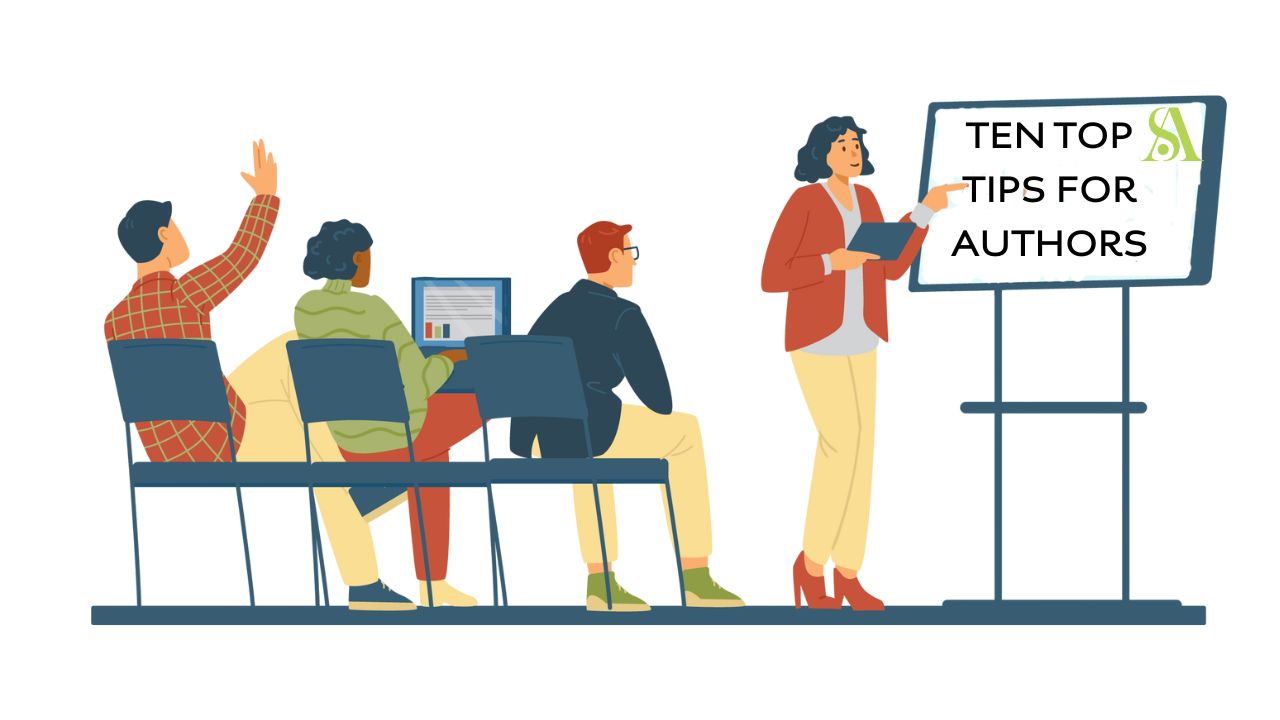Yesterday, Thursday 3 April, the Society of Authors (SoA) organised a day of action to deliver a message to Meta: a letter detailing our strong objections to the scraping of copyright-protected works to train its AI model, Llama 3.
Around 150 authors made their voices heard at the protest outside Meta’s London headquarters with SoA fellows Sita Brahmachari, Tracy Chevalier and Kate Mosse joining calls for Meta to pay compensation to creators for their alleged use of authors’ copyright-protected works.
The SoA’s Chief Executive, Anna Ganley, Chair of the SoA’s Management Committee, Vanessa Fox O’Loughlin (aka the crime writer Sam Blake) and member and event organiser, AJ West, attempted to deliver the letter, but the doors were locked.
You can read the press release for the protest here.
The SoA will now send the letter to Meta’s US headquarters demanding Meta pays such damages or profits relating to the infringement of the copyright of UK authors as may be agreed or, in default of agreement, determined by the court.
The letter is co-signed by the Association of Authors’ Agents, the Association of Illustrators, the Authors’ Licensing and Collecting Society, the Creators’ Rights Alliance, the National Union of Journalists and the Writers’ Guild of Great Britain.
You can read the letter in full, below.
Private File - Access ForbiddenM. Zuckerberg Esq.
Chairman & Chief Executive Officer,
Meta Platforms, Inc
3 April 2025
Dear Sir,
COPYRIGHT INFRINGEMENT
THE USE OF THE LIBRARY GENESIS DATASET
The Society of Authors is the UK’s largest trade union for all types of authors (which expression is used in this letter to include writers, scriptwriters, illustrators and literary translators) representing over 12,000 members.
On 20 March 2025, The Atlantic published a report under the headline ‘The Unbelievable Scale of AI’s Pirated-Books Problem’ (“the Atlantic article”). The Atlantic article reports on the evidence which has been revealed in court documents in legal proceedings (the “US Proceedings”) which are being pursued against Meta Platforms, Inc., (“Meta”) before the United States District Court, Northern District of California, San Francisco Division (Case 3:23-cv-03417-VC). The Atlantic article contains a number of allegations about the practices which were adopted by Meta at the time of the development of its AI model, Llama 3.
As with all Large Language Models, Llama 3 needed to be trained on a huge amount of material in which copyright is owned by authors, and for which consent from the rightsholders was required and adequate remuneration paid. Yet the evidence reported in The Atlantic article supports the allegation that, instead, decisions were taken at the very highest level at Meta, to download and use the Library Genesis dataset (“the Lib Gen dataset”), which is one of the largest pirated collections of books available globally, containing over 7.5 million books and 81 million research papers.
In September 2024, we wrote to you putting Meta on express notice that copyright-protected works can only be exploited with the authorisation of the rightsholder in accordance with s.16(1) Copyright Designs and Patents Act 1988 (the “CDPA”). We did not receive a response to our letter, nor the undertakings requested that Meta would respect the rights of copyright owners.
In the US Proceedings, it is alleged that Meta committed direct copyright infringement under 17 U.S.C. § 501 of each of Plaintiffs’ copyrighted books and that reproduction of Plaintiffs’ copyrighted books without permission is not fair use under 17 U.S.C. § 107. The use of copyright-protected works as input to train and develop an AI model without permission from the rightsholder also amounts to clear copyright infringement in the UK (s. 16(2) CDPA) and it is equally clear that scraping copyright-protected works to train, develop and operate AI models without permission does not fall within any of the permitted acts under the CDPA.
Given the allegations contained in the Atlantic article, Meta is required irrevocably to undertake in writing within twenty-one days:
- To provide a comprehensive schedule of the works of UK authors (including derivative works such as translations) which Meta has scraped from the Lib Gen dataset and which have been used to develop Llama 3. The schedule must include full particulars of each work including but not limited to the title and the name of the author.
- Immediately to permanently remove from Llama 3 all the works of UK authors which have been unlawfully scraped in the course of its development.
- Not in the future to use, exploit or otherwise deal in any work by a UK author or any substantial part of any work, nor to cause or permit any other person to do any such act, for the purpose of training an AI model without first obtaining consent.
- Not otherwise to infringe copyright in all, or any substantial part, of the work of a UK author.
- To provide a witness statement within a further 21 days, endorsed with a statement of truth, from a properly authorised officer of Meta, confirming that Meta has complied fully and promptly with the obligations imposed by paragraph 1 and 2 above and that the information supplied under paragraph 1 is accurate and comprehensive.
- To pay such damages or profits relating to the infringement of the copyright of UK authors as may be agreed or, in default of agreement, determined by the court.
Once the undertakings have been provided, please confirm that you will then meet with representatives of the undersigned bodies in order to seek to agree the compensation to be paid to UK authors.
Please confirm receipt of this letter by return and provide the undertakings requested within the time period prescribed. Meanwhile, the rights and remedies of all our members in relation to the matters raised in this letter are fully reserved.
This letter is supported and co-signed by:
- Association of Authors’ Agents (AAA), a voluntary trade association comprising literary agencies from the UK and the Republic of Ireland.
- Association of Illustrators (AOI), professional body representing illustrators and the wider illustration industry.
- Authors’ Licensing and Collecting Society (ALCS), which represents over 125,000 members.
- Creators’ Rights Alliance (CRA), a collective of leading trade associations, unions and organisations representing and supporting the interests of creators in the UK and representing over 500,000 creators.
- National Union of Journalists (NUJ), the trade union representing journalists and media workers in the UK and Ireland.
- Writers’ Guild of Great Britain (WGGB), the trade union for writers in TV, film, theatre, audio, books, poetry, comedy, animation and videogames.
Yours faithfully,
Anna Ganley
Chief Executive
The Society of Authors
